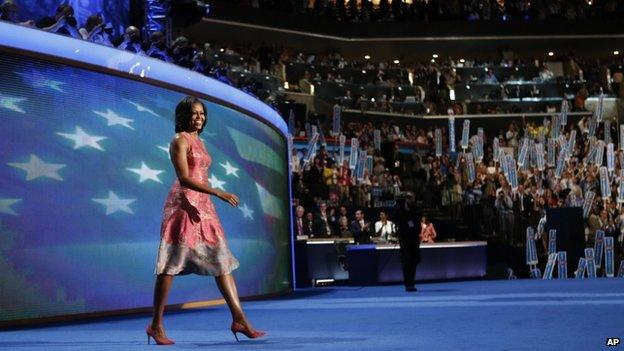For Michelle, the personal is political
- Published

Michelle Obama may look more polished than the past but her message was that the Obamas understand the struggles of normal American families
In 2008 Barack Obama repeatedly asked: "Are you fired up and ready to go?" This time, his party is taking no chances.
While the Republicans deliberately played it cool last week, the first night of the Democratic convention was about whipping up the delegates into a defiant defence of the president's achievements - and warning that they could all disappear if they don't act.
The star of the show was Michelle Obama - her popularity rating is sky-high compared with her husband's. It was a skilful speech and an interesting contrast to Ann Romney's.
Both women stressed their husband's compassion. Both talked lovingly about their love. Both talked about their early life with their husbands in relative poverty. Tell me, is a coffee table found in the rubbish and an ironing board as a dinner table a requirement for keeping down with the Joneses?
But the First Lady's speech, unlike Mrs Romney's, was highly political. She made the case that President Obama's personal story drove his politics and made him compassionate.
She and he were from similar backgrounds, her father going to work struggling with muscular sclerosis (MS), his grandmother waking at dawn to catch the bus to the bank where she was held back because she was a woman. Mr Obama believed in what they did.
"They simply believed in that fundamental American promise that, even if you don't start out with much, if you work hard and do what you're supposed to do, then you should be able to build a decent life for yourself and an even better life for your kids and grandkids."
She said that was why he wanted to pass healthcare reform, why he wanted to save the American economy.
"Barack knows what it means when a family struggles. He knows what it means to want something more for your kids and grandkids.
"Barack knows the American Dream because he's lived it… and he wants everyone in this country to have that same opportunity, no matter who we are, or where we're from, or what we look like, or who we love."
Chasing the female vote
Note, by the way, that last part - there is a big appeal to the gay vote here. Just think how powerful that would have been, if Mr Obama had announced his support for gay marriage in the middle of last week's Republican conference, if Vice-President Joe Biden had not blown it for him, and forced his hand.

Women's voices featured loudly on the first day of the convention
Mrs Obama described herself as the mom-in-chief, and that helps with a key demographic as well.
Her speech was far more than just an appeal to women voters. But it was the culmination of an evening that showed a pretty relentless focus on women voters.
It is ironic that just as the convention got underway there was some evidence that women are going off Mr Obama. ABC's pollster Gary Langer writes about the new opinion poll under the headline: Obama's popularity dips underwater, external.
It is, he says, "the lowest pre-convention personal popularity of an incumbent president in ABC News/Washington Post polls since the 1980s."
But the dip in the women's vote is perhaps even more important.
Whether the Democrats knew about the polling evidence or not they had designed their first day to allow women to tell stories portraying President Obama's re-election as important for them.
Maria Ciano said she grew up in a Republican family and still believed in small government but warned that the Republicans "want to deny me the power to make the most personal decisions about my life. That's not small government. That's not the America I love."
Nancy Keenan, the leader of a pro-choice group, external said: "Put simply, women in America cannot trust Mitt Romney. We cannot trust Mitt Romney to protect our health. He would repeal Obamacare, taking away our access to better maternity and prenatal care, and the law's near-universal coverage of birth control. And we cannot trust Mitt Romney to respect our rights."
And there was Lilly Ledbetter, in a wonderful Alabama twang, talking about the equal pay act that bears her name, external.
Preaching to the converted
It answered one of my questions about how the Democrats' strategy would evolve. Scaring voters about Mitt Romney is key. But sounding negative, while it works, tarnishes the Obama brand.
This testimonial politics allowed people to talk about the need to keep President Obama and stop his opponent without having to harp on about Mr Romney.
Of course, it says nothing about how Mr Obama might do things differently in the future, or about the deficit which hit $16tn, external as the convention opened. Indeed it doesn't contradict the Republican narrative that Mr Obama is a nice man, but a lousy president.
But the Democrat strategy is, above all, not about making converts but getting supporters excited once again, or at least excited enough to vote. In the hall, at least, it is working.